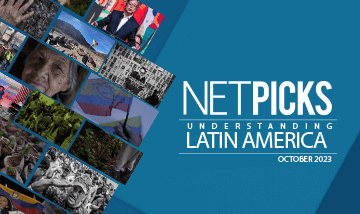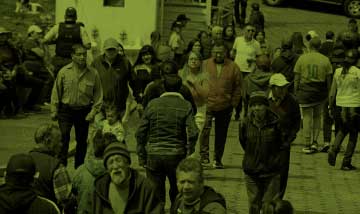Índice
- FROM AN ANTI-RIGHTS RHETORIC TO PUBLIC POLICY: THE RISE OF AUTHORITARIANISM IN LATIN AMERICA
- BRAZIL: OUTSOURCING REPRESSION
- RINGS OF CORRUPTION IN PERU
- ECUADOR’S CRACKDOWN ON ABORTION IS PUTTING WOMEN IN JAIL
- AS AMAZON DEFORESTATION RISES, SENSATIONAL HEADLINES PLAY INTO BOLSONARO’S AGENDA
- THE ROOTS OF THE NATIONAL STRIKE IN HON
- CHILE’S NATIONWIDE TEACHER STRIKE HAS THOUSANDS TAKING TO THE STREETS
- A VICTORY FOR GUATEMALA’S PACTO DE CORRUPTOS
- MOBILIZING WHILE IN MORTAL DANGER
NETPICKS: UNDERSTANDING LATIN AMERICA
Selected food for thought about Latin America. Every month we trawl the web for in-depth analysis, research summaries and opinions we think particularly worth reading, and that you won’t find in the mainstream media.
This month we bring you five articles from Colombia, Brazil, Peru, and Chile, that touch on themes of corruption in Peru, deforestation in the Brazilian Amazon, a major teachers strike in Chile, and the dire post peace accord situation in Colombia, together with an interview with the Regional Director of Amnesty International on the rise of authoritarian governments in the region, and the consequences for human rights in Latin America.
FROM AN ANTI-RIGHTS RHETORIC TO PUBLIC POLICY: THE RISE OF AUTHORITARIANISM IN LATIN AMERICA
In an interview with Francesc Badia i Dalmases of Open Democracy, Erica Guevara, director of Amnesty International in Latin America, outlines the real challenges for human rights in the region in light of the tendency towards authoritarianism and the disregard for the rights of people suffering violence, forced and economic displacement and minorities. States have been more than lax in addressing the issues. For instance, while Latin America and the Caribbean has 8% of the world’s population it is responsible for between thirty five and thirty seven per cent of murders. At the same time countries such as Brazil, Argentina, Chile, Paraguay and, most disconcertingly of all, Colombia, are looking for ways to undermine the Inter American Court of Human Rights, which is one of the only resources available to persecuted groups. Despite the problems, Guevara argues that social movements have achieved, if not necessarily legislative change, important advances in the social climate of many countries. These movements, she argues, are the main hope for challenging authoritarian governments and legislation that threatens rights throughout Latin America. Finally, she states that “We must unmask the pretense in states which call themselves democratic, when in reality we are once again confronting authoritarian apparatuses that are installed through pseudo democratic process…” https://www.opendemocracy.net/en/democraciaabierta/de-la-ret%C3%B3rica-anti-derechos-a-la-pol%C3%ADtica-p%C3%BAblica-autoritarismo-al-alza-en-am%C3%A9rica-latina1-en/ 1 July 2019
BRAZIL: OUTSOURCING REPRESSION
RINGS OF CORRUPTION IN PERU
Corruption is nothing new in Peru: four recent ex-presidents are currently under investigation, while twice president Alan Garcia, also under investigation, shot himself in order to avoid arrest. However, the latest scandals related to Odebrecht have produced major political consequences and different ones than in other countries affected by the bribery scandal. Fujimorismo, led by Keiko Fujimori the daughter of ex-president Alberto, was previously the principal political force within the country, but has been seriously debilitated by the corruption revelations. The actual President, Martin Vizcarra, has consequently been able to gain the upper hand for the first time; he is now calling for early parliamentary and presidential elections with the view to consolidating his power. The left, the initial target of bribery accusations and almost always fractured, has now recovered to some degree and in the form of Veronika Mendoza, the surprise factor of the last Presidential vote, hopes that this time it can show some real strength.
https://nacla.org/news/2019/06/27/rings-corruption-peru César R. Nureña, Federico Helfgott, NACLA, June 27, 2019
ECUADOR’S CRACKDOWN ON ABORTION IS PUTTING WOMEN IN JAIL
AS AMAZON DEFORESTATION RISES, SENSATIONAL HEADLINES PLAY INTO BOLSONARO’S AGENDA
There is little doubt about the existence or global seriousness of deforestation in the Brazilian Amazon region. Scientists and environmentalists have been issuing warnings about the problem for many years. Extreme right winger Jair Bolsonaro’s unexpected rise to power only increased the concern over deforestation and the fate of indigenous groups in the Amazon. That concern is not misplaced. The Bolsonaro government is clearly trying to discredit those people and organizations who are expressing alarm over policies that will facilitate clearing of rainforest, and is calling into question the figures they are using to discredit him and his ministers. The role of the media is consequently of prime importance in the campaign to protect what is left of the Amazon region. Unfortunately some reporting has lacked rigor, which has only legitimized both Bolsonaro’s claims that the figures are distorted, and his push to privatize deforestation monitoring. Bolsonaro may have no problem with distortions that favor him, but those worried about him and his policies, including the media, cannot afford to provide him with any openings to attack.
https://news.mongabay.com/2019/07/as-amazon-deforestation-rises-sensational-headlines-seed-conflict/ Rhett A. Butler, Mongabay, 08 July 2019
THE ROOTS OF THE NATIONAL STRIKE IN HON
CHILE’S NATIONWIDE TEACHER STRIKE HAS THOUSANDS TAKING TO THE STREETS
After seven weeks, on the 23rd of July the eighty thousand strong teachers union in Chile decided to end its strike over working conditions, an unpaid historic debt, and an end to the country’s neoliberal education modeI. Important gains were made, but the end of the strike does not imply an end to protest; according to the leader of Union, it is simply a tactical withdrawal, and the struggle for change will go on. The following article provides an outline of how education in Chile is still controlled by the constitution approved in the time of Augusto Pinochet, which places teachers, and the educational system itself, in the private rather than public sector. Two ‘socialist’ governments lead by Michel Bachelet were not enough to change the situation in any meaningful sense. The failure to reach any kind of meaningful agreement resulted in the rejection of the center left ‘Concertation’ coalition, the formation of the current more radical teachers group and the major work stoppage. Broader changes are also under way in the Southern Cone country. While the presidential candidate of the newly formed Frente Amplio (Broad front) was not able to reach the second round of voting and a run off against Sebastian Piñera, she did come within 2% of beating the ‘Concertation’ candidate. This bodes could bode well for an end to the long standing hold Pinochet and the military have exercised over Chile.
https://jacobinmag.com/2019/07/chile-teacher-strike-student-movement
Sebastián Uchida Chá, Jacobin, 11th July 2019
A VICTORY FOR GUATEMALA’S PACTO DE CORRUPTOS
MOBILIZING WHILE IN MORTAL DANGER
Two and a half years after the signing of the peace accords in Havana, Colombia appears to be little closer to reconciliation than before. With the presence of a right wing anti accord government in Bogotá, led by Ivan Duque and sponsored by ex-president Alvaro Uribe, the situation is still extremely grave. According to the ‘Unidad Nacional de Victimas’ in 2018 more than 130,000 people were directly affected by the conflict: 989 were murdered and 114,889 displaced. These are hardly reassuring numbers. The route to peace consequently seems as foggy as ever, with paramilitaries, guerrilla dissidents, the military itself and drug traffickers all involved, and sometimes overlapping. While the scenario is grim, social activism, which previously suffered from supposed links to the FARC, is slowly gathering steam. The student marches at the end of 2018, the indigenous strike at the beginning of 2019 that blocked the Pan American Highway for a month, the one day national strike of April of this year, and the recent massive march of July 26 against the killing of social activists, clearly show that not all is lost. Whether this renewed activism can continue, or can hold or even advance on the electoral success of Gustavo Petro in 2018 (41% of the presidential vote) remains to be seen.
https://www.rosalux.de/en/publication/id/40597/mobilizing-while-in-mortal-danger/ David Graaff, Rosa Luxemburg Foundation, June 2019





